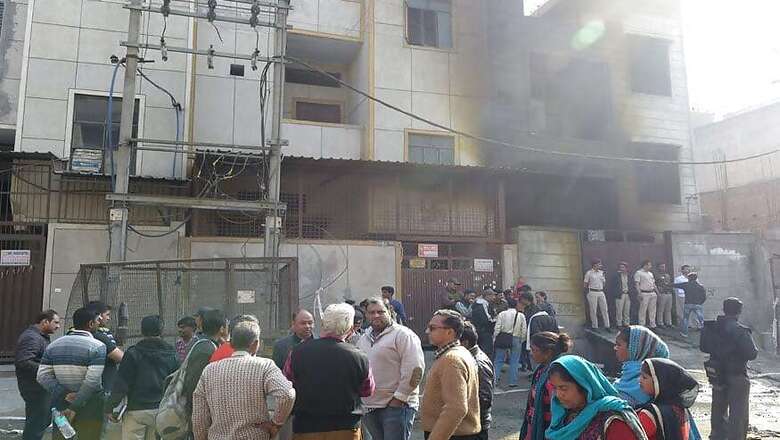
views
Bawana, Delhi: On a Sunday morning in Bawana Industrial Area’s Sector 5, hundreds gathered outside F-83, the building where a fire broke out on Saturday evening. The blaze, which started from the ground floor storage room, ripped through the three-story building, killing 17 workers.
Neeraj Kumar, a migrant worker from Bihar’s Purina, looks at the scorched building and thanks the gods that it wasn’t his building that caught fire. “It could have been any building. The working conditions in Bawana are so bad that nobody has any chance of escape if a fire breaks out. It could have been me,” he said.
Around 6.20pm on Saturday, the fire station received word of a fire that had broken out. It took over four hours to control the blaze. By then, 17 of the 41 labourers inside the illegal cracker factory had died. According to police officers on the scene, as well as local residents, the workers inside had little chance of survival.
Pappu Mahato, who runs a tea shop just 500 meters from the factory, described the working conditions of the factory employees. “In a few factories here, the owners shut the gates of the factory after nightfall, lock them up and leave the workers inside, where they continue to toil through the night. Owners who have something to hide often do this, so that when cops come around they don’t get to go inside. Most factories, like this one, have only one gate. If the one and only entry and exit route is locked and a fire breaks out like it did, what chance do these workers have? The loss of life would have been far more on a weekday. Usually, around 75 labourers work here but on that day, only around half turned up since it was the weekend,” he said.
NO ESCAPE ROUTE
The locked gates are not the only hazard for workers. F-83, like most “factories” in Sector 5, is essentially a house that doubles up as a manufacturing unit. Apart from a first-floor balcony and a terrace, there is no other escape route. The few windows it has are welded shut with wire meshes and iron grilles. To its left is an abandoned plot, but there is no way to get there except a 30-foot jump from the terrace. To the right is another such “factory” that has been abandoned, but its terrace is shut off by an iron grille.
The only other way to escape the fire would have been to jump from the first-floor balcony, but chances are that many jumpers would not even clear the gate and end up falling head-first into the inferno. Those lucky enough to clear the distance would most certainly end up with broken bones.
Ram Singh, an engineer in the Disaster Management Department at the District Magistrate’s office, said, “From what we have gathered, some people jumped off the first-floor balcony and managed to survive. Others made the jump from even higher, from the terrace. There was gross negligence here and clearly, this factory did not follow all the rules.”
All buildings in the lane are stuck next to each other, with no space in between them, and electrical wires hang loosely from poles. How the fire did not spread to the other buildings is a surprise to most officials and volunteers at the site.
Devendra Kumar, a migrant worker from Madhubani who works at a chemical factory right opposite F-83, said workers have devised their own safety mechanisms and worked out escape routes but they may not always work. “Since the buildings share walls, we have decided that we will jump to the next building and then on to the next. However, that won’t work if the fire spreads to other buildings as well.”
NO SAFETY MECHANISM
While factories, including both F-83 and the building that Devendra Kumar works in, do have fire extinguishers, they are rendered useless as the workers don't know how to operate them. Ram Singh explained, “We found an unused fire extinguisher among the debris in this building. All it would take is a few hours’ worth of training but workers don’t end up going for the workshops we hold because their bosses would cut a full day’s pay. These workshops could be the difference between life and death but workers don’t go for them because Rs 250 a day is a huge amount for them.”
The owner of the factory, Manoj Jain, was arrested and booked under section 304 (culpable homicide not amounting to murder, and negligent conduct with respect to fire or combustible material) of the Indian Penal Code. The factory, which became operational only 20 days before the incident, is supposed to only run a packaging unit.
Yet, locals allege, that firecrackers were also being manufactured here. One local resident said, “Most of the workers joined this factory because it pays more than other places. Other places pay Rs 5,000 but this place paid Rs 7,000 a month. The condition was that they (workers) were not to divulge details of the work they do here. Clearly, the factory was doing something they did not have the permit for.”
Sidheshwar Shukla of the Centre of Indian Trade Unions (CITU), a wing of the Communist Party of India, said after visiting the site on Sunday morning, “Bawana is said to be one of the best industrial areas in Asia and yet, this is the condition of workers here. These places are essentially death traps for workers. Locking them inside is not just inhuman, it is as good as a death sentence.”
Hours after the incident Delhi Chief Minister Arvind Kejriwal and Urban Development Minister Satyendra Jain reached the spot. The BJP, which runs the Municipal Corporation of Delhi, has been on the back foot after North Delhi Mayor Preeti Aggarwal was caught on camera allegedly admitting that it was the MCD that had approved the factory’s license. Meanwhile, the Delhi Government announced a compensation of Rs 5 lakh each for the kin of the deceased.
But Shukla feels that is simply not enough. “The Delhi Chief Minister has announced Rs 5 lakh as the compensation amount but that is a paltry amount. This will do nothing for the families that have lost their breadwinners. Men and women, who supported their families, have died. Of course, the value of a human life cannot be compensated. But the families should be able to sustain themselves.”



















Comments
0 comment